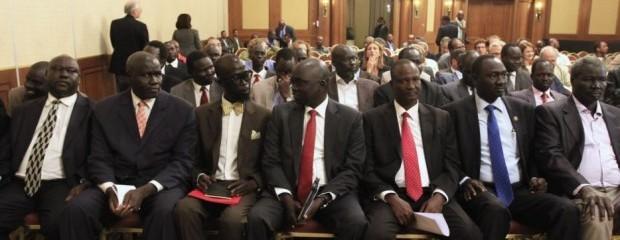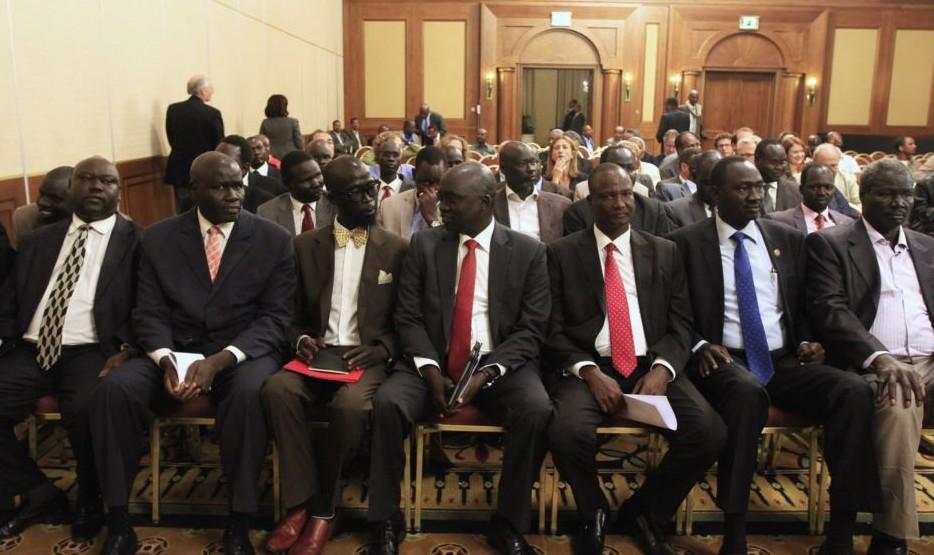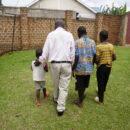South Sudan talks must make provision for Justice and Reconciliation – By David Deng and Elizabeth Deng


Delegates participating in the talks between Salva Kiir and Riek Machar’s SPLA groups currently in conflict in South Sudan.
As representatives of Salva Kiir and Riek Machar meet in Addis Ababa to negotiate a ceasefire to the conflict that has engulfed South Sudan in past weeks, the question of what a mediated outcome might look like is at the forefront of everyone’s mind. Judging from public statements made by the two sides, there does not appear to be much common ground between them. Kiir maintains that Machar has tried to claim power through violence and as such cannot be rewarded with a power-sharing arrangement. Machar asserts that Kiir is responsible for the mass killings that took place in Juba in mid-December 2013 and is no longer fit to lead the country.
In the face of increasingly vocal calls for accountability from international leaders and South Sudanese civil society, the two parties have begun to acknowledge the need to investigate crimes committed in Juba and elsewhere in the country. Taban Deng Gai, head of Machar’s delegation in the Addis talks, has called for free access for humanitarian organizations and United Nations Human Rights Council to investigate atrocities and human rights abuses. For its part, the Government has announced the creation of two committees: one to investigate the killing of innocent civilians and the other to examine the causes of the divisions within the presidential guard. These public statements are a welcome first step, but specific and binding commitments to accountability must be detailed in any negotiated settlement in order to ensure that investigations and prosecutions actually take place.
Peace processes in South Sudan have a long track record of prioritizing reconciliation at all costs and failing to secure remedies for people affected by conflict. The 2005 Comprehensive Peace Agreement (CPA), which brought an end to the 22-year north-south civil war in Sudan, included only a vague reference to national reconciliation and neglected to mention the issue of accountability for past human rights violations. The ongoing efforts of the church-led Committee for National Healing, Peace and Reconciliation, established by presidential decree in April 2013, has so far been silent on the question of accountability. Past efforts to neutralize rebel groups in Jonglei, Unity and Upper Nile states have been initiated with offers of blanket amnesties and attractive political and military appointments; truth and justice have never figured in the negotiations.
Sidelining justice in peace negotiations may help to expedite political settlements in the short-term, but it fails to adequately address the question of impunity that lies at the heart of internal conflicts in South Sudan. Attempts to bury the past also give rise to contested and obscured histories, sowing the seeds for continued abuses by political and military actors in the years to come.
To avoid repeating past mistakes, an integrated process of truth-telling, justice and reconciliation should be included in any mediated agreement between Kiir and Machar. The two parties should be compelled to submit themselves and their supporters to an independent investigation into the crimes committed. Those that are found to be responsible should be punished through fair and public judicial mechanisms. Handshakes, smiles and a mere political settlement between the two parties will not set South Sudan on a path towards truth, sustainable peace, democracy and the rule of law.
The Need for a Hybrid Court
If the parties can agree to the principle of justice, the next question is how best to provide it in the context of South Sudan’s weak justice system. Past efforts to secure justice for crimes committed in the course of large-scale violence have all been hampered by the poor investigative capacity of police and prosecutors and the limited geographical reach of civilian courts. In Jonglei state, for example, thousands of people, including women and children, have been killed, tortured or abducted in the context of inter-communal violence, forced disarmament programs and government counter-insurgency campaigns in recent years. Yet, those responsible for the crimes, be they civilians, soldiers or politicians, have enjoyed almost total impunity.
Given the lack of capacity, credibility and independence of the justice system, it is clear that without international support, impartial investigations and prosecutions cannot take place. Such international support could best be provided within the framework of a hybrid court established within South Sudan’s judiciary. Hybrid courts have been deployed to address the legacy of large-scale conflict in countries such as Sierra Leone, East Timor, Kosovo and Cambodia. Senegal recently established a hybrid court to prepare a case against former Chadian president Hissí¨ne Habré.
The defining feature of a hybrid court is that it is administered by a combination of national and international staff. By recruiting highly qualified judges, investigators, prosecutors and defense attorneys to work alongside their South Sudanese counterparts, a hybrid court can provide the support that is necessary for the fair adjudication of serious crimes, while helping to strengthen national accountability mechanisms and rule of law in the longer-term.
Due to the high cost of hybrid courts, the focus would be limited to those who bear primary responsibility for planning, organizing or carrying out the most egregious crimes. In order to extend justice beyond cases tried by the hybrid court, prosecutions should also be brought before other South Sudanese courts. The judiciary could consider using its power to establish special courts with limited temporal and thematic jurisdiction to try crimes that have occurred since December 2013. In order to adequately address the crimes that have been committed, South Sudan must also ensure that its legal framework provides for the punishment of international crimes, including genocide, war crimes and crimes against humanity. As the penal code does not define these crimes, new legislation would be necessary.
Prosecutions in the hybrid court and formal judiciary could be linked to the customary court system to extend truth, justice and reconciliation processes to the grassroots level. South Sudan’s customary court system has a strong emphasis on restorative justice, in that chiefs and traditional authorities encourage disputing parties to talk through their differences and finding a solution that is acceptable to both parties. While customary courts are not legally empowered to adjudicate criminal responsibility, they are well positioned to promote reconciliation in circumstances where the line between perpetrator and victim is blurred. Customary courts could also play an important role in negotiating compensation awards and other civil remedies.
An Integrated Response to Truth, Justice and Reconciliation
Justice is only one part of a solution to the conflict in South Sudan. In order to heal the wounds caused by the recent violence, South Sudan must adopt an integrated response that incorporates truth-telling and meaningful reconciliation and ultimately seeks to transform South Sudan’s abusive and corrupt governance systems.
In 2013, the Government began trying to address South Sudan’s history of conflict through the establishment of a Committee for National Healing, Peace and Reconciliation. The Committee could make a valuable contribution to an integrated approach to truth, justice and reconciliation, but to do so, it would need to expand its mandate to include a truth-telling component. By providing a public platform for victims to tell their stories and perpetrators to confess to their wrongs and seek forgiveness, the Committee could help South Sudanese to build a national narrative of their troubled past.
There are other actions that the Government could take to build a culture of human rights in South Sudan. South Sudan has not yet ratified the core human rights treaties that prescribe the minimum standards by which a state must treat its citizens. The Government has acceded to the 1949 Geneva Conventions and their Additional Protocols and has ratified the Convention Against Torture, the Convention on the Rights of the Child and the Convention Governing Specific Aspects of Refugee Problems in Africa, but it has not ratified the other core treaties, such as the International Covenant on Civil and Political Rights or African Charter on Human and People’s Rights.
In order to make clear the Government’s commitment to human rights and give victims and their representatives recourse to regional and international treaty monitoring bodies and complaint mechanisms, the Government should immediately ratify these treaties and domesticate them into national law. It should also sign on to the Rome Statute as a demonstration of its commitment to justice for international crimes.
Conclusion
South Sudan stands on a precipice. Viewing the crisis as a problem that can be solved by the political and military class alone would repeat the same mistake that has been made in past negotiations. Hybrid courts require a great deal of political will, diplomatic effort and material resources to establish. Even if the parties were to agree, it would take many months to establish a hybrid court in South Sudan. Nonetheless, if South Sudan is to come to terms with the violent events of the past few weeks, it is vitally important that the issue of accountability be addressed in any negotiated agreement between Kiir and Machar. If the parties fail to agree on or to implement a mechanism for holding perpetrators of the violence accountable, the Security Council could consider referring the matter to the International Criminal Court (ICC).
Until South Sudan’s leaders are made accountable to the people they serve and punished for the wrongs they commit, the country will continue to experience violence like what we have seen in the past weeks and the dream of a peaceful and prosperous nation will never be realized.
David Deng is the Research Director for the South Sudan Law Society (SSLS), a civil society organization based in South Sudan. Elizabeth Deng is a human rights lawyer based in Nairobi.







The history of South Sudan is the enemy of South Sudan. Most current conflicts are carried as a ravage mission of passed conflicts and yet there are less solution to combat the continue ravage conflicts among communities and ethnicities.
In one of the worst campaigns of mass slaughter since World War II, more than 2.5 million civilians have been killed in Sudan over decades of brutal conflict between north and south, in Darfur in the west, and in other regions. Since the 1950s, the Arab-dominated government of Sudan, centered in the capital Khartoum, has tried to impose its control on the country’s African minorities living along the nation’s periphery. The result has been a deadly mix of ethnic, religious, and politically motivated conflicts. Though the north-south civil war is over and South Sudan gained its independence in July 2011, violence has continued. Citizens in Darfur and the border areas between the two countries remain at risk.
[…] Fredsprocessen mÃ¥ste vara inkluderande och rättvisa och försoning mÃ¥ste bli en del av fredsförhandlingarna i Addis Abeba om freden ska bestÃ¥, skriver David Deng, Research Director pÃ¥ South Sudan Law Society och juristen Elizabeth Deng. â€To avoid repeating past mistakes, an integrated process of truth telling, justice and reconciliation….†[…]